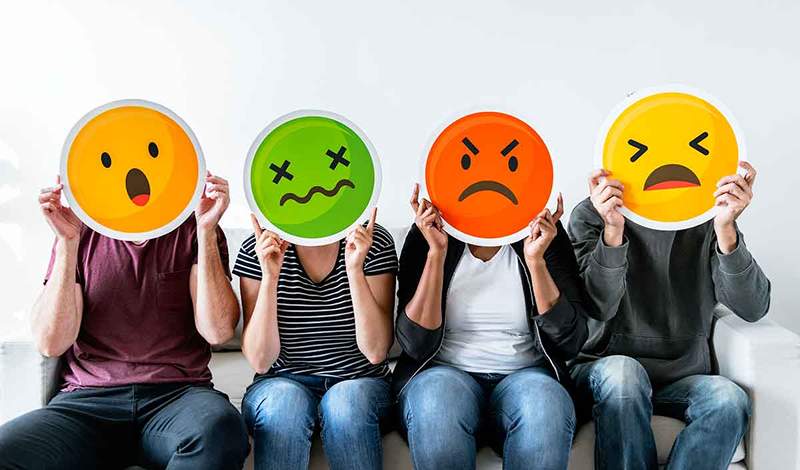The negativity bias. What is and how can you overcome it

- 4473
- 1041
- Charles Fay
"Bad things" are easier to believe and we will reveal you the reasons why this occurs. What is known how The "negativity bias" refers to our predisposition to "attend, learn and use much more than positive information" (Vaish et al., 2008)
This common bias for most people can make sense to why on many occasions we find that:
● We remember more criticism than compliments
● We respond emotionally more intensely to "negative" stimuli than to positive
● We have constant and intense thoughts of unpleasant events
● We quickly focus on negative information rather than positive
Various studies have established the idea that This bias fulfills an adaptive function for the human being (Carpaccio and Bernston, 1999). We must consider that thousands of years ago humanity was exposed to many environmental threats and therefore it was of vital importance to learn to analyze and capture potentially negative stimuli in a priority to ensure the survival of the species.
However, The human brain continues to use these resources to face current life, in which most of these dangers have disappeared. At the biological level Negative emotions awaken the tonsil, an ancestral brain structure related to the immediate fight-huida reactions. We could say that the amygdala is a kind of "brain alarm" specialized in activating before the bad news. Once this alarm sounds, the events are quickly recorded in memory to analyze any event that may suppose a danger.
Content
Toggle- The brain is activated more in the face of negative events
- Check out the news
- We ruminate more negative events
- How can negativity bias be overcome?
- A few final words
The brain is activated more in the face of negative events
Today, this type of bias plays a very relevant role in early development during childhood. In a study conducted by Ito and his colleagues (1998), They found that our brains respond more intensely to negative stimuli. The researchers presented photos to 33 participants and measured the electrical activity of their brain to study their answers.
Some were emotionally neutral (for example, a dish), others were considered positive images (people enjoying a roller coaster) and others were considered negative images (a gun pointing to the camera, a mutilated face). The results were expected, brain activation was more intense when participants observed images with negative connotation instead of positive or neutral.

Check out the news
If you stop for a moment to observe all the articles, The news and ads that most attract attention are predominantly negative. Why are they so frequent? A possible hypothesis in this regard is that, due to the bias of negativity, the coverage of negative events attracts much more attention than the positive. This is a logical deduction that we can extract based on the study that we have mentioned previously. But does the case always happen?
In 2019, another interesting study was conducted in this regard, to determine whether culture or nationality showed any difference in this regard. The results showed that negativity bias is produced worldwide. Humans respond and we are more attentive to negative news on average without limits or borders.
 Aaron Beck's irrational beliefs
Aaron Beck's irrational beliefs We ruminate more negative events
It has happened to us all on occasion, we become obsessed with a comment, a criticism or a fact that has happened to us at the beginning of the week and at the same time everything positive seems to disappear from our radar. In several articles as one published in 2009 by Larsen It is suggested that negative emotions on average are longer than the positive. That is, we usually spend more time thinking about negative events than positive and also reason more about it.
This is interesting to the learning processes by which the more attention we pay to a concept or event, the greater the probability that it will be registered in our memory.
How can negativity bias be overcome?
As we have commented, attention plays a fundamental role in the negativity bias. If we decide consistently, constantly and consistently about positive thoughts, we can begin to reduce the asymmetry produced by the negativity bias.
I propose some tactics to be able to reduce it:
Look at your internal negative dialogue and replace it with much more positive approaches, it is about Reformulate negative statements, for more empowerrs and positive. Instead of affirming "I am a failure," turn it into "every day I am closer to success, but on the way it is normal not to succeed with everything I try".
Learn to savor the positive moments and stop for a few minutes to live that experience. Giving you time and observing all the feelings, emotions and sensations you experience, you are facilitating to your mind the creation of a new positive memory in your memory, you are creating your own inventory of positive memories. Therefore, the next time you are in a moment of enjoyment, invest a little more time than usual to savor it.
A tactic that may seem somewhat strange at the beginning is to reduce the distance with that destructive internal voice. Change it through a friendlier tone, like the one you would use when you are talking to a friend. At that time we ask curious questions how for example “are you okay?"," Why are you so angry?". The idea is to interrupt that voice that is talking to us in such a negative way and Apply the golden rule in ourselves: "treat others as we would like them to treat us". This implies applying goodness and compassion to your own being.
A few final words
All in our day to day face sadness, rejection, fear. However, when we are blocked in negative aspects of life, it is extremely useful to be aware of why we are doing it. We may be programmed evolutionively to react in this way, but that does not mean that we are not able to redirect the situation and train to change the patterns established in our mind. We will always be able to convert our brain to create more positive patterns that encourage our well -being, self -esteem and personal security
We all face rejection, sadness, fear and unhappiness. However, when we are stuck in the negative aspects of our life, it is useful to be aware of why we could be doing it. We may be evolutionively scheduled to focus on negative things, but it is possible.
- « 90 Robert Frost phrases
- Endowment Effect ”or endowment effect. We value more a product that we already have »

